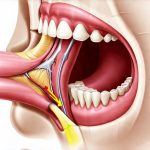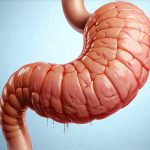The subtle interplay between our physical and emotional states often manifests in unexpected ways. Many people experience seemingly unrelated symptoms – jaw tightness alongside excessive air swallowing (aerophagia) being one common example. While individually bothersome, these issues frequently exist as part of a connected system, where tension in the jaw can directly contribute to increased air intake, and conversely, the discomfort from excess gas can exacerbate jaw clenching. Understanding this connection is crucial not just for symptom management, but also for addressing underlying causes that may be driving both problems simultaneously. This article will explore the intricate link between jaw tension and swallowing excessive air, examining potential causes, related conditions, and strategies for relief.
The human body isn’t compartmentalized; it operates as a holistic unit. When we experience stress or anxiety, it rarely presents as one isolated symptom. Instead, it often manifests across multiple systems – digestive upset, muscle tension, difficulty sleeping, and changes in breathing patterns are all common responses. Jaw tension is particularly sensitive to emotional states because the muscles involved in chewing and speaking are closely linked to our nervous system’s stress response. Similarly, swallowing air isn’t always a conscious act; it can occur subconsciously when we’re anxious, stressed, or even focused intently on something else. Recognizing this interconnectedness helps shift the focus from treating individual symptoms to understanding the underlying mechanisms at play and developing more effective, long-term solutions.
The Physiology of Jaw Tension & Aerophagia
Jaw tension isn’t simply about tight muscles; it’s a complex physiological response driven by multiple factors. The masseter, temporalis, and other muscles responsible for chewing are constantly working, even when we aren’t actively eating. Prolonged or excessive use – through habits like teeth grinding (bruxism) or clenching – can lead to fatigue, pain, and inflammation. This tension isn’t confined to the jaw itself; it radiates upwards into the head and neck, often causing headaches, earaches, and even dizziness. Importantly, the act of swallowing is intimately linked to jaw movement. The coordinated sequence of muscles involved in chewing and deglutition (swallowing) means that a tense jaw can disrupt normal swallowing patterns.
Aerophagia, or excessive air swallowing, isn’t usually a sign of an underlying medical condition itself but rather a symptom driven by behavioral or physiological factors. Normal swallowing does involve taking in small amounts of air, which is then typically released through burping. However, individuals experiencing aerophagia swallow significantly more than normal, leading to bloating, abdominal discomfort, and feelings of fullness. This can happen during eating (swallowing air with food), drinking (especially carbonated beverages), or even when not consuming anything at all – a subconscious habit developed in response to stress or anxiety. The disruption of normal swallowing patterns caused by jaw tension directly contributes to this increased air intake.
The connection becomes clearer when you consider the mechanics of swallowing. A relaxed, coordinated movement allows for efficient food passage and minimal air ingestion. But if the jaw muscles are tight, it can alter how we position our tongue, close our lips, and coordinate the entire swallowing process. This altered mechanism frequently results in more air being drawn into the mouth during each swallow, even when attempting to avoid it. Furthermore, individuals with chronic jaw tension may subconsciously change their breathing patterns – taking shallower breaths or relying on chest breathing instead of diaphragmatic breathing – further exacerbating aerophagia.
The Role of Stress and Anxiety
Stress and anxiety are arguably the most common culprits behind both jaw tension and air swallowing. When we’re stressed, our bodies activate the sympathetic nervous system, triggering a “fight-or-flight” response. This leads to muscle tightening, increased heart rate, and rapid breathing – all contributing factors to jaw clenching and aerophagia. – Chronic stress can lead to habits like teeth grinding during sleep (nocturnal bruxism), further intensifying jaw tension. – Anxiety can manifest as subconscious behaviors such as repeatedly swallowing or gulping air in an attempt to regain control or soothe feelings of discomfort.
The link between mental health and physical symptoms is profound. Often, individuals aren’t even aware they’re clenching their jaws or swallowing excess air; it happens automatically when under stress. This creates a vicious cycle: stress leads to tension and aerophagia, which then cause physical discomfort that increases anxiety, leading to more stress and the continuation of the cycle. Recognizing this cyclical pattern is the first step towards breaking it. It’s essential to explore strategies for managing stress and anxiety – techniques like mindfulness meditation, deep breathing exercises, yoga, or counseling can all be incredibly beneficial. Understanding jaw tension is key here.
Bruxism & Its Impact on Swallowing
Bruxism, the involuntary grinding or clenching of teeth, is a significant contributor to jaw tension and, consequently, aerophagia. While stress is a common cause, bruxism can also be related to sleep disorders (like sleep apnea), misaligned teeth, or certain medications. The constant pressure exerted on the jaw muscles during bruxism leads to muscle fatigue, inflammation, and even TMJ (temporomandibular joint) disorder – a condition affecting the jaw joint and surrounding muscles. – Nocturnal bruxism is particularly problematic because it occurs unconsciously during sleep, making it difficult to address without intervention. – Even mild bruxism can disrupt normal swallowing patterns over time, leading to increased air ingestion.
The mechanics of bruxism directly impact swallowing. The constant grinding and clenching alter the position of the jaw, tongue, and lips, disrupting the coordinated movements needed for efficient deglutition. This leads to a less streamlined swallowing process, increasing the likelihood of swallowing excess air. Furthermore, the pain and discomfort associated with TMJ disorder can cause individuals to subconsciously modify their chewing and swallowing habits, further exacerbating aerophagia. Addressing bruxism – through interventions like mouthguards or stress management techniques – is therefore crucial for reducing both jaw tension and excessive air swallowing. It’s important to remember sleep positioning can also play a role in related discomforts.
Identifying & Addressing Underlying Causes
Pinpointing the root cause of jaw tension and aerophagia requires careful self-assessment and, potentially, professional evaluation. It’s not always easy to determine what’s triggering these symptoms, as they can be influenced by a multitude of factors. – Consider your stress levels: Are you experiencing significant stress or anxiety in your life? – Evaluate your habits: Do you clench your jaw during the day or grind your teeth at night? Do you eat quickly or gulp down liquids? – Assess your breathing patterns: Are you relying on chest breathing instead of diaphragmatic breathing?
If symptoms are persistent or significantly impacting your quality of life, consulting a healthcare professional is recommended. A dentist can assess for bruxism and recommend appropriate interventions like mouthguards. A physical therapist specializing in TMJ disorder can provide exercises to strengthen and relax the jaw muscles. And a mental health professional can help you develop strategies for managing stress and anxiety. Addressing underlying conditions – such as sleep apnea or gastroesophageal reflux disease (GERD), which can also contribute to aerophagia – is equally important. Digestive inflammation could be a factor, too. The goal isn’t just to manage symptoms but to address the root causes driving them, leading to lasting relief and improved well-being. Additionally, consider if food reactions might be contributing to your discomfort. Recognizing a potential link between reflux and other symptoms can also be helpful in diagnosis and treatment. Finally, be aware of the connection between gut pain and potential dietary triggers.


















